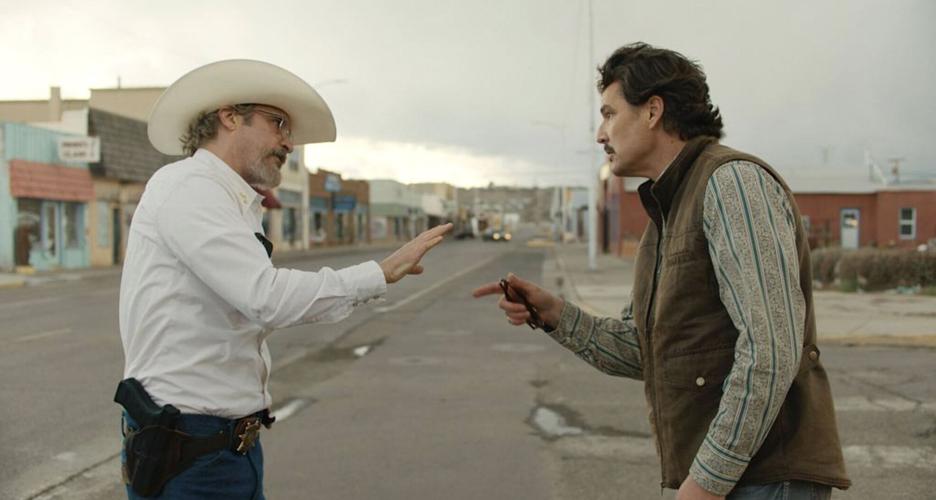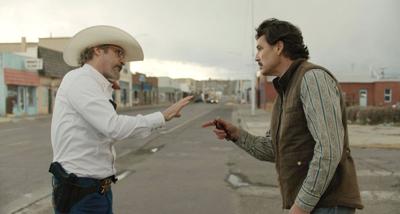ItÔÇÖs easier to describe what Ari AsterÔÇÖs pandemic drama ÔÇťEddingtonÔÇŁ lacks than to say what it has.
ItÔÇÖs a satire without laughs. A fright movie without jump scares. A western without an obvious villain. A social commentary minus a moral compass. On balance, ÔÇťEddingtonÔÇŁ might best be described as a fractured memory piece, a not-so-funhouse reflection of a painful era.
Set in the summer of 2020, the first COVID year, it features many elements of what we all recall from pandemic times ÔÇö masks, physical distancing, paranoia ÔÇö but it also inspires a sense of wonder that┬áCOVID and its associated social tumult really happened at all. Wonder turns to a collective shudder as we contemplate connections between the disease back then and the global ills of today.
After exploring horror and fantasy for his first three full-length films ÔÇö ÔÇťHereditary,ÔÇŁ ÔÇťMidsommarÔÇŁ and ÔÇťBeau Is AfraidÔÇŁ ÔÇö writer-director Aster anchors himself in bleak but recognizable reality for his fourth feature, which takes place in the fictional New Mexico town of Eddington, population 2,435.
ItÔÇÖs a dusty place on the edge of normality, a description appropriate for the first inhabitant we encounter: a barefoot, bedraggled and mentally ill drifter named Lodge (Clifton Collins Jr.) who rages incoherently about the world. HeÔÇÖs certainly timely. Everybody in Eddington is dealing with their own personal hell, made all the hotter by the deprivations of COVID.
Sheriff Joe Cross, played by a bearded and bespectacled Joaquin Phoenix, is an old-school lawman who doesnÔÇÖt talk much and who prefers persuasion to enforcement. HeÔÇÖs not a fan of mask protocols ÔÇö he uses an inhaler that suggests breathing issues ÔÇö and frankly doubts whether┬áCOVID has even made it to Eddington. He intervenes when a grocer forbids a maskless senior, who also has respiratory problems, from entering his store.
ÔÇťThereÔÇÖs a way to do it,ÔÇŁ Joe insists, as he defends the senior and assists him with his shopping, all while not wearing a mask himself. Joe might seem more of an authority figure if he wasnÔÇÖt clutching a jumbo package of Goldfish crackers as he speaks.
His idiosyncratic approach to law and order puts him at odds with the townÔÇÖs smooth-talking mayor, Ted Garcia (Pedro Pascal), who obeys all the┬áCOVID edicts. Ted, the single dad of a teenage son (Matt Gomez Hidaka), wants to drag Eddington into the 21st century by supporting the construction of a giant new AI data centre. It will create many jobs but also irrevocably change the nature of this quirky desert town. ÔÇťWe canÔÇÖt go back, we can only go better,ÔÇŁ TedÔÇÖs re-election campaign billboard pitches.
Change-averse Joe naturally objects to the data centre, partly due to his conservative nature but also due to his long-standing antipathy toward Ted. JoeÔÇÖs wife, Louise (Emma Stone), briefly dated Ted 20 years ago and although Ted insists nothing of any consequence happened, Joe suspects otherwise.
Louise doesnÔÇÖt have much to say about the matter or anything else. Still suffering the effects of a troubled childhood, she has little warmth for the perpetually glum Joe. She spends her day making strange dolls and following the charismatic ravings of online influencer and conspiracy theorist Vernon Jefferson Peak (Austin Butler).

Conspiracy theory believer Louise (Emma Stone, left) and her like-minded mother Dawn (Deirdre OÔÇÖConnell) are among the star-studded cast of Ari AsterÔÇÖs pandemic-era satire, ÔÇťEddington.ÔÇŁ┬á
VVS Films/A24 FilmsLouiseÔÇÖs mother, Dawn (Deirdre OÔÇÖConnell), lives with her and Joe, and she likewise is caught up in the alternate realities of Peak and other online agitators, people who believe the Sasquatch is real, the Deep State rules and the Titanic sinking was no accident.
His pride hurt and his dander up, Joe decides to run for mayor against Ted. He enlists his two reluctant deputies, Guy Tooley (Luke Grimes) and Michael Cooke (Micheal Ward), to act as his campaign advisers. Soon Joe is driving his slogan-festooned squad car through town, blaring campaign propaganda from his loudspeaker. Meanwhile, tensions are erupting throughout the town as Sarah (Am├ęlie Hoeferle), a white local teenager, starts leading Black Lives Matter protests, blocking traffic.
ThereÔÇÖs no cause too remote for Eddington. Accusations fly about ÔÇťAntifaÔÇŁ false-flag operations, encroaching wokeness, sexual deviancy and other alleged threats ÔÇö and then conspiracy king Peak decides to pay the town a visit.
Such civic mayhem would be fertile narrative ground in other small-town films ÔÇö think of last yearÔÇÖs ÔÇťRebel RidgeÔÇŁ and ÔÇťThree Billboards Outside Ebbing, MissouriÔÇŁ from 2017 ÔÇö but Aster whirls it all into a maelstrom of angry farce.
HeÔÇÖs assembled a brilliant cast and created strong characters but hasnÔÇÖt given them much of a back story or much of anything to say, and thereÔÇÖs no reason to care about any of them. Aster slices into both the hysterical right and the smug left, which is all to the good, but his satiric sword has a dull blade.
Everything descends into violent chaos in the third act, a situation more likely to prompt shrugs than tears.
Cinematographer Darius KhondjiÔÇÖs lens doesnÔÇÖt flatter its subjects. It courts the dusk and dust of AsterÔÇÖs world. Key scenes are shot through windows, windshields and other barriers, or viewed through computer and smartphone screens, concealing as much as they reveal.
Composers Daniel Pemberton and Bobby Krlic craft a score that is at once ominous and playful, as if the soundtrack itself is holding its breath, waiting for the inevitable explosion.
And what of the AI data centre, the source of much of this ferment? A glimpse of the fortress-like facility, way off yonder gobbling electricity and water as it crunches info in its ceaseless effort to replace humans, suggests the town and the world have more to worry about than a new virus.

































To join the conversation set a first and last name in your user profile.
Sign in or register for free to join the Conversation